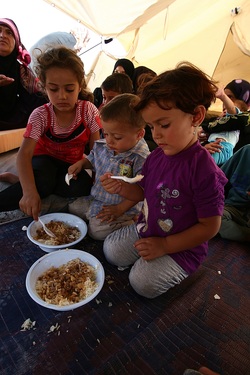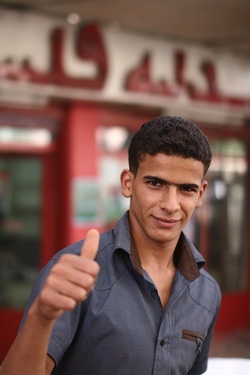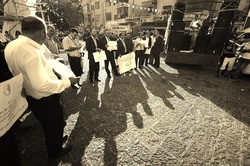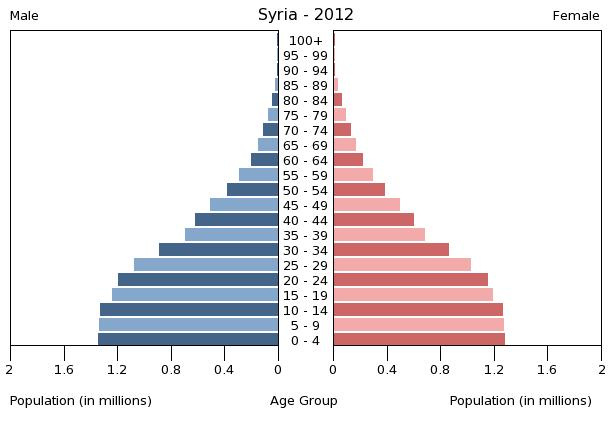2 Comments
 Op 27 december waren er 562,950 wachtende op en geregistreerde Syrische vluchtelingen in de buurlanden. Daarvan zijn er 147,107 geregistreerd in Turkije, 126,724 in Libanon, 116,778 in Jordanië, 67,015 in Iraq en 12,836 in Egypte. Als we de verhoudingen bekijken dan zien we dat 54% van de vluchtelingen jonger zijn dan 18 jaar zijn. 44% tussen 18-60 jaar en 2 % ouder dan 60 jaar. De leeftijdscategorieën blijven in verhouding in de verschillende landen. Als we kijken naar de populatie piramide zien we dat Syrië een jonge bevolkingsstructuur heeft. Dit vertaalt zich in een jonge vluchtelingenpopulatie. Er zijn dus meer dan 250.000 kindervluchtelingen. (bron: Statistieken UNHCR) Vele van deze kindervluchtelingen hebben de laatste 20 maanden hun thuis verloren, zijn getuigen geweest van of hebben geweld meegemaakt, hebben geen onderwijs genoten en hebben nu weinig ondersteuning voor de winter. Deze vluchtelingenkinderen zijn zich bewust van de problemen om hun heen en proberen hun familie en geliefden te ondersteunen en te beschermen. Zij dragen een juk dat ze anders niet zouden moeten dragen. Er zijn drie dingen waar de vluchtelingenkinderen vooral problemen mee hebben, dat is ten eerste het tekort aan stabiliteit omwille van de onzekerheid in hun sociale en fysieke omgeving. Ten tweede problemen op school omwille van de taalbarrière in Libanon en Turkije en de sociale uitsluiting op de scholen in die landen. Ten derde angst omwille van het feit dat ze gescheiden zijn van hun familie of moeten werken zodat hun familie kan overleven. ( bron: World Vision Lebanon)
“Raed, een tien jarige Syrische vluchteling, de winterse stormen en bliksems doe hem denken aan het geluid van bommen die rond hem ontploften in Syrië” Wat brengt 2013? Volgens UNHCR gaat het aantal vluchtelingen in de komende 6 maanden nog verdubbelen. De humanitaire respons is uiterst moeilijk omwille van sociale en politieke onrust in de buurlanden en de economische problemen. Men moet onderlijnen dat de buurlanden enorm gastvrij zijn naar de vluchtelingen toe en open grenzen blijven onderhouden. Het risico bestaat ook dat het Syrische conflict zich gaat verspreiden in de buurlanden. Omdat er geen politieke oplossing voor de crisis in zicht is betekent dit dat er massaal humane en financiële middelen moeten worden vrijgemaakt. Op 19 december werd er een collectieve oproep gelanceerd om 1 miljard dollar vrij te maken voor de eerste 6 maanden van 2013. Na de aardbeving in Haïti zijn ongeveer 6.000 Haïtianen naar Brazilië geëmigreerd. De Haïtianen verkiezen Brazilië omwille van haar relatief open grenzen in vergelijking met de VS en de prijs van de reis naar Brazilië is maar ongeveer even duur als naar de VS.
Brazilië verwelkomde de illegale Haïtiaanse diaspora na de aardbeving.omwille van humanitaire redenen De minister van Justitie, Cardozo, vertelde dat elke vluchteling recht heeft op politiek asiel. Er is sprake van een echte emigratiegolf naar Brazilië, in de Braziliaanse kranten spreken ze over de grootste toevloed van immigranten sinds die van de Japanners en van de Italianen. Er heeft zich reeds een echte gemeenschap gevormd. Snel werd echter duidelijk dat mensensmokkelaars betrokken waren bij de immigratie die het lot van vele Haïtianen bezegelde. Daarom is op dit moment de houding van de Braziliaanse overheid gekanteld naar een meer restrictief beleid om de mensensmokkel tegen te gaan. Brazilië het beloofde land De Haïtianen beginnen hun reis naar Brazilië in Port-au-Prince, daar nemen ze de bus naar Santo Domingo, de hoofdstad van de Dominicaanse Republiek. In Santo Domingo nemen ze een vliegtuig naar Lima. Daar nemen ze dan de bus naar Iquitos, om vervolgens een gevaarlijke boottocht te ondernemen van Iquitos naar Tabatinga in Brazilië. Ze worden begeleid door “coyotes” of “gidsen” van Haïtiaanse origine, die duizenden dollars verdienen met de mensensmokkel. De relatief open grens tussen Peru en Brazilië is het ideale werkterrein van de mensensmokkelaars. De Haïtianen gaan dan meestal aan de slag in de illegale hout- en mijnbouwindustrieën. In februari 2012 stelde de Braziliaanse overheid 520 000 dollar ter beschikking over een periode van 5 jaar om in de grensstaten van Acre en Amazonia de illegale Haïtianen aan een visum te helpen en hen aldus legaal aan het werk te krijgen. Volgens Robert Montinard van Viva Rio, gespecialiseerd in dit thema en zelf Haïtiaanse immigrant in Brazilië, is de immigratie via Peru maar het topje van de ijsberg. Hij zegt dat de migranten al in de buurlanden van Brazilië woonden en dan naar Brazilië zijn vertrokken omwille van de economische bloei in Brazilië. Ze werken aan de stadia voor het WK voetbal en de Olympische Spelen. De Haïtianen gaan op zoek naar een beter leven, maar velen van hen zijn ontevreden over de arbeidsvoorwaarden. Hun loon en levenssituatie is niet echt wat ze zich hadden voorgesteld. Grenzen gesloten In augustus zaten 105 immigranten al maanden vast in het Peruviaanse dorp Iñapari, op de grens met Brazilië en Bolivia. Hun situatie was dramatisch en enkelen van hen gingen in hongerstaking. De oorzaak was dat Brazilië haar grens dicht hield voor de immigranten, en ze kregen geen humanitaire assistentie in Peru. Lokale instanties kunnen de toevloed niet meer aan Verder nog in augustus zaten er 210 Haïtianen vast in Brasileia dicht bij de grens met Peru en Bolivia. Zij waren aan het wachten op de legalisering van hun verblijfsdocumenten. De lokale overheid begon met humanitaire assistentie voor de kandidaat-immigranten die gedehydreerd en hongerig aankwamen na een tocht van enkele dagen in het Boliviaanse Amazonewoud. Zij werden op 18 september geregulariseerd. Op dit moment wil de lokale overheid van Brasileia geen humanitaire assistentie leveren aan de Haïtianen omdat Brasileia geen geld meer heeft. Nu leven de Haïtianen er op straat en kunnen ze moeilijk aan eten geraken. De lokale overheid van Brasileia ging hiervoor naar de centrale overheid, maar die twijfelde nog over het te volgen beleid. De beleidskeuzes waren: ofwel hun verblijf legaliseren of hen terugsturen naar Haïti of Peru. Repatriëring komt in beeld Deze tendens is te voelen in heel Latijns-Amerika, meer en meer wordt er overwogen om de Haïtianen te repatriëren. Na de aardbeving was er een moratorium ingesteld op het terugsturen van de migranten uit humanitaire overwegingen, maar ondertussen is het beleid veranderd en is de repatriëring terug in beeld gekomen. Verschillende Haïtianen kregen al het bericht dat ze moesten vertrekken in februari vorig jaar. Ze gingen zelf zo ver in hun schreeuw naar papieren dat ze opriepen tot collectieve zelfmoord. In maart verkondigde minister van Justitie Cardozo dat er geen massale repatriëring zou gebeuren. Op 8 november besliste de Braziliaanse overheid echter nog om de driemaandelijkse repatriëring niet te laten doorgaan, maar het quotum om per jaar 1200 Haïtianen te legaliseren blijft behouden. Waarom de plotse omzwaai in het beleid? Volgens Antonio Patriota, minister voor buitenlandse zaken in Brazilië, is de oorzaak hiervoor dat de Braziliaanse overheid de georganiseerde misdaad (mensensmokkel) wil bestrijden die de immigranten exploiteert. Cardozo, minister van Justitie vertelt erbij dat de coyotes vaak gelinkt zijn aan de drugssmokkel en samen met de Haïtiaanse immigranten criminelen het land binnen brengen. Montinard zegt echter:” Dit zal de illegale migratie niet afremmen. Haïti is het armste land van Latijns-Amerika, veel Haïtianen dromen van een beter leven. Wat de immigratie wel zal afremmen, is dat als ze geld willen versturen naar hun familie in Haïti dit vaak niet mogelijk is omdat ze daarvoor een Braziliaanse bankrekening nodig hebben. Aan een Braziliaanse bankrekening geraken is zeer moeilijk voor de Haïtianen.” Conclusie Na de aardbeving werden de Haïtianen met open armen ontvangen, ze kregen humanitaire assistentie en werden aan het werk gezet door lokale ngo’s die zich bekommerden om hun lot. Helaas werd het beleid grondig herzien om de illegale migratie te stoppen omdat er niet genoeg geld is om al de Haïtianen op te vangen en om de mensensmokkelaars aan te pakken. De grenzen werden gesloten, humanitaire assistentie werd stopgezet en het leven van de Haïtianen werd steeds moeilijker. Voor de Haïtianen voldoet Brazilië niet aan hun verwachtingen. De vraag is nu of de Haïtianen in Brazilië gaan blijven. Vele Haïtiaanse illegale immigranten zijn niet vrij om te kiezen wat ze doen omwille van het feit dat ze vaak vastzitten aan de mensensmokkelaars, ze zijn medeslachtoffers van een mensonwaardig systeem. Of vinden ze een weg om zich op een legale manier te integreren in de Braziliaanse samenleving? Daarvoor werken ngo’s zoals AMA Haïti, Caritas, Companhia de Jesus ,… Willemjan Vandenplas 21 december 2012  Un espectro se cierne sobre Ramallah, capital de Cisjordania. Hay días que las calles se llenan con activistas y otros días no hay nadie en la calle por causa de una huelga del transporte público. La ocupación y las malas políticas de los últimos años tienen al pueblo Palestino completamente dominado. La ocupación es la causa, Israel controla la tierra, el agua, el aire, las fronteras, el combustible, los precios de los productos básicos y todo el comercio con otros países pasa por Israel. Sin embargo, no es la única razón, el pueblo Palestino paga un doble precio, porque el FMI y el Banco Mundial imponen la lógica neo-liberal en el ámbito económico. La misma que causó tanta miseria en los países Latinoamericanos. Esas políticas resultan en más problemas que soluciones para el Pueblo Palestino. Están en una crisis financiera y ya tienen una deuda de 2000 millones de Euros. El gobierno aumentó los impuestos y el tva. Resulta que una taza de café sale más en Ramallah que en Londres. La lucha sigue, los sindicatos se movilizan Los sindicatos que se fortalecen cada vez más y exigen un sueldo mínimo y seguridad social. Ahora hay obreros, sobre todo mujeres, que ganan 80 euros por mes. Los empleadores no quieren gastar más que 150 euros en un sueldo mínimo, pero los sindicatos no aceptan esto. El ministro de economía interior prometió instaurar un sueldo mínimo en el sector privado y público. Esta promesa surgió después de meses de lucha social y presión de los sindicatos. El ministro de trabajo dijo que el sueldo mínimo resultaría en condiciones de vida dignas y no pondría en riesgo el desarrollo económico. El 7 de octubre el gobierno declaró que el sueldo sería 375 dólares o 20 dólares por día o 2.5 por hora. La propuesta fue rechazada por el PGFTU, la Federación General de Sindicatos, ellos declararon que era mucho menor de lo que ellos querían (450 dólares). El sindicato exige desde hace años un sueldo mínimo. Lamentablemente tenemos que constatar que el sueldo es tres veces más bajo que en Israel, aunque los precios sean iguales. Los días siguientes los obreros tomaron la calle con el lema: “ precios altos, sueldos bajos”. El gobierno replicó que 300.000 obreros se van a beneficiar de esta medida y que reconoce las protestas como legítimas. Los otros sindicatos dicen que el sueldo mínimo es un logro unánime del pueblo Palestino. La lucha por el sueldo mínimo es una de las luchas que se desarrollan en Cisjordania. El pueblo palestino descubre realmente la fuerza de los sindicatos. Los sindicatos fomentan la ocupación de plazas, cortes de transporte público, huelgas de funcionarios. Son signos que los sindicatos que exigen justicia social ganan fuerza. Resulta que la crisis financiera que toca Cisjordania se ve como razón de las protestas. Los sueldos bajos y los precios altos crean una idea en la mente del pueblo Palestino que las políticas del primer ministro Salam Fayyad y su partido fallan. Ellos rechazan la idea del libre comercio. En septiembre y octubre los opositores pidieron su renuncia. El noticiero Almaannews dijo que iba a ofrecer su renuncia. El 30 de octubre él propuso formar un gobierno de unidad nacional, pero esta propuesta fue rápidamente rechazada por los partidos de izquierda y Fatah. Mientras tanto la crisis financiera sigue. Los Estados Unidos y la Unión Europea prometieron aumentar su asistencia financiera a 200 millones de dólares cada uno. Diferentes países europeos depositaron dinero y también Omán y los Emiratos Árabes Unidos. Así se puede pagar los sueldos de los funcionarios. Según el noticiero Almaannews el primer ministro de Israel Benjamin Netanyahu pidió la asistencia porque tenía miedo de un colapso de la Autoridad Palestiniana (AP) y de las protestas sociales. Soluciones para el conflicto social Según Wajih al-Ayassa, DWRC, el gobierno en Ramallah tiene que cambiar sus prioridades, el foco debe estar en la gente: “ Debe haber más protección social, la corrupción debe diminuir y la ocupación debe terminar. Las politicas tienen que ser más humanas.” Si los sindicatos tienen éxito y ganan su apoyo, podrían lograr resultados importantes.  Stilletjes aan beginnen de Palestijnen die leven op de Westelijke Jordaanoever de kracht van vakbondsacties te ontdekken. Onder impuls van de vakbonden, waaronder ook fos-partner PGFTU, worden pleinen bezet, wordt het openbaar vervoer lam gelegd en staken ambtenaren. Het zijn tekens van de steeds sterker wordende vakbonden die sociale rechtvaardigheid eisen. De financiële crisis die de Westelijke Jordaanoever treft, wordt gezien als de oorzaak van het protest. De stijgende prijzen en de lage lonen creëren bij de Palestijnen het bewustzijn dat het economische beleid van premier Salam Fayyad en zijn partij 'De Derde Weg' faalt. Ze verwerpen de vrije-marktlogica van premier Fayyad. In september en oktober vroegen de betogers zijn ontslag. Almaannews berichtte dat premier Fayyad er aan dacht zijn ontslag aan te bieden. Op 30 oktober stelde hij voor een regering van nationale eenheid te vormen, maar dit werd al snel verworpen door de linkse partijen en voor Fatah was de tijd nog niet rijp. Ondertussen bleef de financiële crisis verder duren. De VS en de EU beloofden elk 200 miljoen dollar financiële hulp te geven. Verschillende EU-landen stortten geld samen met de Verenigde Arabische Emiraten en Oman. Dit maakte het mogelijk om op korte termijn de lonen van de ambtenaren uit te betalen. De plotse steun van de internationale gemeenschap is een vrij nieuw gegeven in de geschiedenis van de Palestijnse Autoriteit(PA). Een duidelijke aanwijzing dat de protesten wel degelijk effect hebben is dat de Israëlische eerste minister Benjamin Netanyahu volgens Almaannews heeft opgeroepen tot financiële steun aan de PA. Hij zou dit doen uit vrees voor het protest op de Westelijke Jordaanoever en voor het uiteenvallen van de PA. Als de vakbonden er in slagen hun draagvlak verder uit te bouwen, kunnen zij op termijn belangrijke resultaten boeken. Op 7 oktober werd al een minimumloon ingevoerd in de privé- en publieke sector, hoewel dit nog steeds erg laag ligt. |
Archives
January 2015
Categories
All
|

 RSS Feed
RSS Feed
